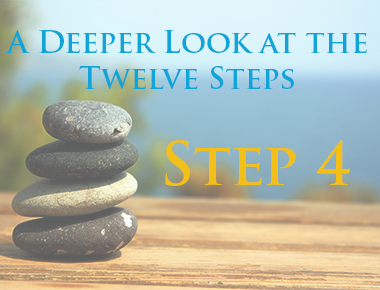
A Deeper Look at the 12 Steps: Step 4
“Made a searching and fearless moral inventory of ourselves.”
What is step 4 of the 12 step program? The fourth step along the 12-step journey to sobriety asks us to evaluate ourselves honestly. Nearly every Alcoholic Anonymous participant will agree—that takes unusual courage and uncommon humility.
Making an inventory can seem daunting, as it means you need to re-examine your past in an honest way, even those events and feelings you usually avoid thinking about. It may help to remember as we consider step four of the 12 steps that creating an inventory doesn’t change anything, it clearly identifies what is true and accurate.
Confronting Our Reflection

People drink or use drugs for many different reasons. Often trauma, fear, guilt, depression, or resentment play a role in a developing addiction. When we reach this stage of asking “What is step 4 in AA,” the answer lies within ourselves. By embracing newfound clarity and self-awareness we are ready to take an honest look in the mirror and face the truth. We do this “fearlessly” meaning that we do not let fear, grief, or shame stop us from looking deeply at our own lives.
We must ask ourselves the critical questions:
- What stops us from staying sober?
- What character traits, habits, or emotions stand between us and our goals?
- How did we contribute to our own problems?
- Which relationships in our lives are harmful?
- What motivates us to do the difficult work of recovery?
It may be helpful to start with a timeline of your life, marking major events, then other important experiences as a starting point. Some people simply start writing down the most memorable points and work forward or backward from there. Putting these things down in writing allows us to look at our inventory of experiences and understand where we have been, and how we got here.
Telling Ourselves the True Story
What is step 4 of the 12 steps? We reach this milestone when we can tell ourselves the truth about our lives. That story might be painful to put into words, we might feel shame and remorse, and we will work through resentment and anger along the way. We seek to understand ourselves without making excuses. We take responsibility for where we are and for what we have done along the way.
We have counselors, sponsors, and friends in recovery to help us face these hard truths and difficult challenges. They have seen and heard life stories like ours before, and they understand how difficult—and how transformative—step 4 can be. Don’t hesitate to reach out to your group or sponsor for support as you work through creating your inventory and the emotions that may rise to the surface during the process.
Carrying the Light of Honesty Forward

What is the 4th step of AA and why is it so important? Because taking this inventory gives you a strong foundation to move ahead knowing that you are evaluating yourself and others honestly. Self-deception is a habit that allows us to avoid the truth, but self-awareness allows us to trust ourselves and others again.
Shining light onto suppressed feelings and memories exposes this important truth—the past does not have to continue to define who we are. By seeing ourselves clearly we have the ability to change our futures. We can live differently from this point forward if we understand and acknowledge what has come before.
At Yellowstone Recovery, we help thousands of people through all stages of recovery at our treatment center in Orange County, CA. Our compassionate team helps each individual find the level of treatment that will best support their full recovery. If you or a loved one needs help fighting addiction or preventing relapse, contact us today for the guidance and support you deserve.








